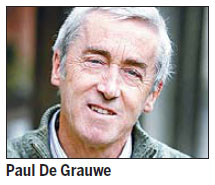China's economic shift 'could spark European revival'
Updated: 2013-03-07 08:07
By Fu Jing (China Daily)
|
||||||||

Economist sees move as a happy development
A shift by China from an investment and export-driven economy to a consumption-led model is viewed by a European economist as a move that could help revive the continent.
"I think this would be a happy development for Europe, not only for China," said Paul De Grauwe, former economic policy adviser to the European Commission and professor at the London School of Economics and Political Science.
Rebalancing the Chinese economy to make it more consumption-based would also create more opportunities for European business to export more to China, the Belgian told China Daily in an exclusive interview.
The financial crisis in 2008 and 2009 and the European sovereign debt crisis have shown the Chinese government the risks of being overly dependent on exports, De Grauwe said.
As the National People's Congress, the nation's top legislative body, and members of the Chinese People's Political Consultative Conference, the top political advisory body, hold their annual meetings, they are expected to draw up measures on how to rebalance the economy, a decision made by the country's leaders at the 18th National Congress of the Communist Party of China in November.
"That would certainly be something Europeans would be happy to have," said De Grauwe, also professor of international economics at the University of Leuven in Belgium.
De Grauwe said China's continuing urbanization and industrialization will create more export opportunities for Europeans. Meanwhile, the country's expanding middle class will consume more European goods, and Chinese are increasingly showing an interest in Europe as tourists or as investors.
But De Grauwe believes trade between China and Europe is not balanced, leading Europeans to fear many of their industries will fall victim to this imbalance.
"If you move in the direction of rebalancing it will certainly reduce this fear and create a potentially more balanced relationship," he said.
But China is not entirely to blame for the imbalance, De Grauwe added.
"We have to do our homework as well. If we keep the euro too strong it will also make it more difficult for China to rebalance."
De Grauwe said finding a correct balance between the euro and the renminbi will allow the European Union to discover more markets in China. A weak euro will help rebalance China's economy by boosting European exports.
"We should take away the fear factor about China, and see it as bringing more opportunities and chances to Europeans so that we can develop a mature relationship," he said.
De Grauwe added: "Basically, the policy of the US Federal Reserve has been very aggressive. Weakening the dollar will result in the Japanese weakening their currency, and as a result we have got a strong currency as we don't do that."
A strong euro has made it more difficult for European businesses to export to China and the US, he said.
"We should go to a more balanced relationship, otherwise people will start reacting like Americans in the past - with protectionist measures against China."
De Grauwe said the internationalization of the renminbi is an important development.
"I do believe we should not have the dollar dominating everything. Why not have another currency bringing more competition? I think it is good for China, which is good for Europe, too."
fujing@chinadaily.com.cn
(China Daily 03/07/2013 page5)

 In Photos: 7.0-magnitude quake hits Sichuan
In Photos: 7.0-magnitude quake hits Sichuan
 Li Na on Time cover, makes influential 100 list
Li Na on Time cover, makes influential 100 list
 FBI releases photos of 2 Boston bombings suspects
FBI releases photos of 2 Boston bombings suspects
 World's wackiest hairstyles
World's wackiest hairstyles
 Sandstorms strike Northwest China
Sandstorms strike Northwest China
 Never-seen photos of Madonna on display
Never-seen photos of Madonna on display
 H7N9 outbreak linked to waterfowl migration
H7N9 outbreak linked to waterfowl migration
 Dozens feared dead in Texas plant blast
Dozens feared dead in Texas plant blast
Most Viewed
Editor's Picks

|

|

|

|

|

|
Today's Top News
Live report: 7.0-magnitude quake hits Sichuan, heavy casualties feared
Boston suspect cornered on boat
Cross-talk artist helps to spread the word
'Green' awareness levels drop in Beijing
Palace Museum spruces up
First couple on Time's list of most influential
H7N9 flu transmission studied
Trading channels 'need to broaden'
US Weekly

|

|







